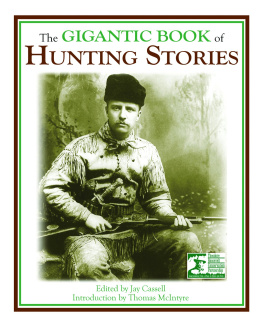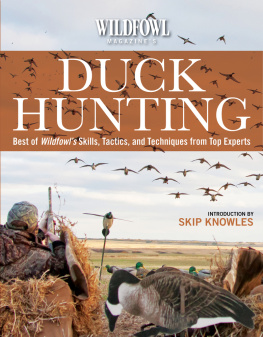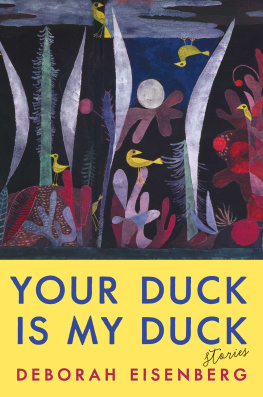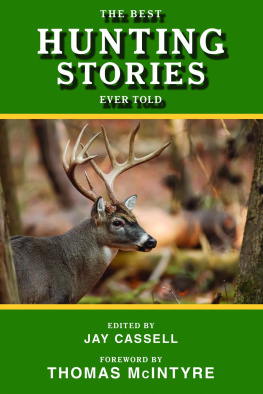


These stories appear with the kind permission of Ellen Gibson Wilson as copyright holder. All rights reserved.
Drawings by Paul Birling
from photographs originally appearing with Gordon MacQuarrie stories published in Field & Stream and Sports Afield.
All rights reserved, including the right to reproduce this book or portions thereof in any form or by any means, electronic or mechanical, including photocopying, recording, or by any information storage and retrieval system, without permission in writing from the publisher.
ISBN# 978-1-62343-592-9
Published by | Willow Creek Press |
PO Box 147 |
Minocqua, WI 54548 |
This book is dedicated to all incorrigibles who follow in the Old Duck Hunters footsteps. Comrades in good fellowship, good fun and good hunting and fishing.

I really dont think I can tell the real story of the MacQuarrie fan club and keep my credibility. When in the second collection we appealed for information to help locate more MacQuarrie stories, they came in from every quarter of the land. Some with a note. Some with copies of the stories themselves. Mostly people wanted to put into words the pleasure the stories gave them. Phone calls! They came at every hour of the day and night. A typical one goes like this: Hey, Zack, I just had to call and tell you how much fun it was reading the MacQuarrie stories. Always moved, but never surprised, that the wonderful yarns carry such impact. I mumble agreement and thanks.
We had some unpublished stories left from the Case collection from which we drew book number two. I added to the list as fans revealed more titles. Friends at Field & Stream, Outdoor Life and Sports Afield where most of the stories appeared would copy the stories for me. Sharing each new prize became like a hobby.
Then came the blockbuster.
Dale Arenz, a Waukesha, Wisconsin lawyer, wrote that he had as a hobby collected over 6000 outdoor magazines. Moreover, they were indexed as to subject and author. Gaping in amazement I had in my hands a neatly typed list of every story MacQuarrie ever wrote and the magazine and the issue in which it appeared. The first was published in Outdoor Life in September 1931. The last was published after the authors sudden and unexpected death in 1956. If Dale Arenzs list is complete, he wrote in all 122 articles during his lifetime. Approximately 64 were Old Duck Hunter stories.
A senior member of the MacQuarrie fan club is Tom Petrie, editor of Willow Creek Press. He was responsible for purchasing the rights from Stackpole and republishing Stories of the Old Duck Hunters and Other Drivel first in paperback, and now in hardcover. Publishing More Stories was his baby and what a handsome baby it is! It is as fine an example of the bookbinders craft as one could want. And dont Paul Birlings incomparable sketches bring the characters to life! Theyre authentic, too. Paul works from photographs that appeared with the stories.
When I recovered from the shock of receiving Dale Arenzs master list, I called Tom immediately. Are there enough for another collection? he asked. Heck, yes, I said. It was full speed ahead. Many of the stories were standard articles on boats, where to go places, even an article on how to take photographs. (The MacQuarrie stories I remembered were all illustrated.) One had special meaning for me. It was how people fall overboard; how some twist and turn to the last, others submit to their fate resignedly. As a beginning freelancer, I took that idea for the third story I ever wrote. How To Fall Out Of A Boat became my first sale. Another debt to MacQuarrie.
Most of the Old Duck Hunter stories were new to me. I asked Dale for copies of these and in due course they arrived. Tom and I selected the 14 best for this volume.
My only regret - and one I know I share with thousands - that unless some new unsuspected cache turns up, it must end here.
Contents


I was doing a story on the worst day in duck huntings history. Armistice Day, 1940, a storm without warning struck upper Mississippi River bottoms with gale force blizzard conditions and sudden freezing temperatures. When it was over, some 50 duck hunters were dead. I called Historical Societies and received copies of four newspapers on the three and four days they reported the storm.
One account stood head and shoulders above the others. In fact, it was so complete and comprehensive that other newspapers reprinted it, an almost unheard of event among competitive newspapers. You have guessed the author - Gordon MacQuarrie.
It came as no surprise to me that MacQuarrie was a crack reporter. Nor did his manner of reporting the event. All the grim details are there - bodies in the snow, capsized duckboats in icy waters, hunters marching and boxing to stave off freezing, men and boys toppling over. MacQuarrie spared no detail.
But with the brave men of those terrible hours were where his heart lay. Rescuers defied the storm at the height of its fury to search for friends. Captains of two Corp of Engineer tugs sailed into the nightmare night to help. Coast Guardsmen defied the swirling blackness to save lives. At dawn two local pilots flew sortie after sortie locating hunters, throwing down food and shouting encouragement, then flying off to bring the tugs. This is what MacQuarrie liked. He unabashedly called them heros and said they deserved medals.
It is this upbeat look at life that is basic to all the Old Duck Hunter stories. MacQuarrie knew pain and sorrow. The grief he attempts to hide after Mr. Presidents death, when the hearts of many men fell to the ground, is almost unbearable.
But that bittersweet opening is followed by The Old Brown Mackinaw with a new Mister President and resurgence of new love. MacQuarrie is quickly back where he likes to be, marching behind the upbeat banner. Life is good. All about us is wonder and delight. Enjoy.
The curious and wonderful thing is that this rubs off on everybody who comes in contact with it. Using clues found in the stories, we have gone back and located the cabin he loved so much. People write and call to describe how they found his favorite pools on the Brule. As the events that made this book possible unfolded I reported them to his daughter and widow, often wearing out the exclamation point on my typewriter. They followed with fascination and applauded the efforts.
Next page









